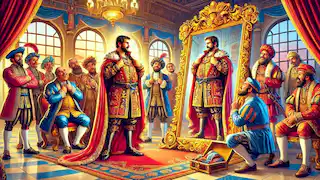The Emperor's New Clothes
In a grand city teeming with culture and opulence, there lived an emperor whose vanity knew no bounds. He was not a tyrant or a neglectful ruler, but he was completely obsessed with his wardrobe. He would spend hours each day trying on different outfits and admiring himself in the mirror. His obsession with fashion was known far and wide, and he would spare no expense to acquire the finest garments and accessories.
One day, news of the emperor's obsession reached the ears of two clever swindlers who decided to take advantage of it. They posed as master weavers and arrived at the palace with a bold claim: they could weave the most magnificent cloth imaginable, so fine and delicate that it was invisible to anyone who was either unfit for their position or hopelessly foolish.
The emperor, ever eager to adorn himself in the most unique and splendid attire, was immediately intrigued. "If I were to wear clothes made of this extraordinary fabric," he thought, "I would be able to identify which of my subjects are unfit for their posts. And I would be the envy of all."
The emperor summoned the swindlers to his court. "Your Majesty," said the first swindler, bowing low, "our cloth is unlike any other. Not only is it incredibly beautiful, but it also possesses the magical quality of being invisible to anyone unfit for their office or simply foolish."
"Marvelous!" exclaimed the emperor. "Such a cloth would indeed be of great use to me. Set to work immediately and weave this extraordinary fabric. You shall have all the gold and silk you need."
The swindlers set up looms and pretended to weave the cloth, though in reality, there was nothing on the looms at all. They worked with empty shuttles and scissors, demanding the finest silk and purest gold thread, which they hid away for themselves. They spent their days enjoying the luxuries of the palace, spinning tales of the wonderful cloth they were creating.
As the days passed, the emperor grew impatient. He wanted to see the progress of the cloth, but he was hesitant. He remembered the swindlers' warning that only those fit for their office could see the fabric. So, he decided to send his most trusted minister to inspect the work.
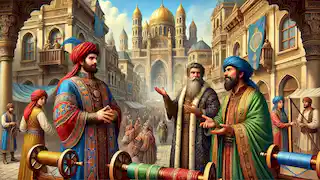
The minister, a wise and honest man, went to the weavers' workshop. He saw the empty looms and the weavers working diligently with invisible thread. "Heaven help me," he thought, "I cannot see anything at all." But he did not dare to admit it. He did not want to be thought a fool or unfit for his position.
"How beautiful!" he said to the swindlers. "The colors and patterns are truly splendid. I shall tell the emperor of your progress."
The swindlers bowed and thanked him, and the minister returned to the emperor with glowing reports of the marvelous cloth. The emperor was pleased and sent more gold and silk to the weavers, urging them to complete the work quickly.
The swindlers continued their charade, pretending to work late into the night, but accomplishing nothing. The emperor sent another official, this time a courtier known for his keen eye and discerning taste. The courtier too saw nothing on the looms but, fearing to appear unfit or foolish, he praised the cloth's intricate patterns and vibrant colors.
The emperor was delighted with these reports. He decided to see the cloth for himself. Accompanied by his trusted officials and a retinue of courtiers, he went to the workshop. The swindlers held up their empty hands as if holding the fabric, and the emperor, though seeing nothing, dared not admit it.
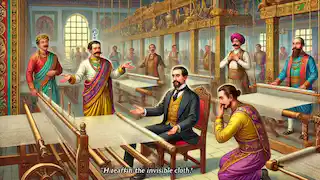
"How splendid!" he exclaimed. "It is indeed the finest cloth I have ever seen. Prepare my new clothes at once. I shall wear them in the grand procession through the city."
The swindlers worked all night, cutting and sewing the invisible cloth, pretending to fit it on the emperor. The next morning, they presented the invisible garments to him. "Here are your Majesty's trousers, your coat, and your mantle," they said. "They are as light as a spider's web. You will feel as if you have nothing on, but that is the beauty of our cloth."
The emperor stripped off his clothes, and the swindlers pretended to dress him in the new garments. They held up an imaginary mirror for him to admire himself. The emperor turned from side to side, pretending to see how well his new clothes fit.
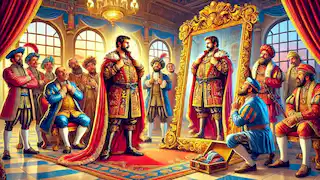
"How well they suit you, Your Majesty!" exclaimed the courtiers. "What a magnificent outfit!"
The emperor, though he saw nothing, did not want to appear foolish. He stepped out into the city, and the procession began. The people of the city had heard of the magical cloth and were eager to see the emperor's new clothes. No one dared to admit they saw nothing, fearing to be thought unfit or foolish.
"What a splendid outfit!" they all cried. "How beautifully it fits the emperor!"

The emperor smiled, feeling pleased and proud. But amidst the crowd, a small child, too innocent to understand the pretense, called out, "But he has nothing on!"
The child's words rang out like a bell. The crowd fell silent. The emperor shivered, for he suspected the child was right. He blushed deeply but continued to walk in the procession, determined to maintain his dignity. His courtiers followed him, still pretending to hold up the imaginary train of his invisible garments.
The swindlers, having completed their con, disappeared with their ill-gotten gains, never to be seen again. The emperor, though humiliated, learned a valuable lesson. He realized that his vanity had made him blind to the truth and that he had allowed himself to be deceived by his own foolishness.
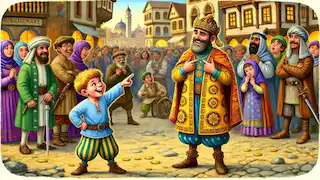
From that day on, the emperor was less concerned with his clothes and more attentive to the needs of his people. He became a wiser and more compassionate ruler, and the people of the city respected him all the more for it.
And so, the story of the emperor's new clothes became a tale told for generations, a reminder of the folly of vanity and the importance of honesty, even when the truth is hard to face.
